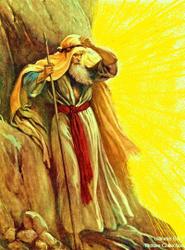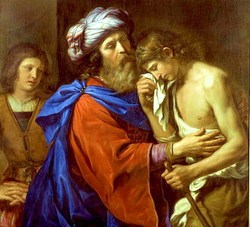The Messiah’s Secret – Show Me Your Glory!
Exodus 33: 7-23. Luke 9: 28-36

My two daughters aged 9 and 7 wanted a pony, however, I didn’t want them to have one, simply because from my own experience when I had my horse, they would be danger of having accidents. After about a year of constantly asking we were persuaded to let them have one.
At the beginning of Exodus 33 Moses as God’s chosen leader of Israel was able to persuade God not to depart from His chosen people, the Israelites. God had said he would honour his promise to their Patriarchs, but He would not go up to Canaan, the Promised Land with them.
The Israelite’s sin had grieved God time and again, but on this occasion it was more serious, they had made an idol while Moses was on the Mount. On his return when Moses saw the idol he was angry and smashed the tablets with the commandments written on them.
God always keeps His promises to those who believe in him, we can trust his words to us. When a problem arises we can remind our self and turn to a promised word from God.
After the golden calf incident, God met with Moses in a tent outside the camp, we read when Moses met with God the people watched and worshipped. God came in the form of a cloud and conversed with Moses like a man with a friend.
God favoured Moses and agreed to show him His glory, ‘The Lord’; and I will be gracious to whom I will be gracious, and will show mercy on whom I will show mercy.”
As God passed by the cleft in the rock, He covered Moses with His hand so as not to see His face, no man could look on God’s face and live, he saw the back of God.
At the Transfiguration a meeting took place between Moses, Elijah with Jesus, while Peter, James and John looked on and saw Jesus transfigured, his appearance glistening white. On this occasion Moses saw God’s face, Jesus being both man and God.
The law God gave to Moses was the shadow, the back of God.
When Jesus fulfilled the law in His death on the cross, he revealed God’s GLORY in his resurrection, God’s grace and mercy in the New Covenant. John the apostle wrote that after Jesus was glorified he would send the Holy Spirit. John 7: 39
God chose Jesus,
John also wrote that God had chosen His own Son to reveal His grace and truth. ”Full of grace and truth; we have beheld his glory, glory as of the only Son from the Father.”
John the Baptist acknowledged that Jesus who came after him, ranks before him “. . . For the law was given to Moses, but grace and truth came through Jesus Christ.” John 1: 14-17.
Jesus knew His calling was to be the Saviour of the world when he said,
“Now is my soul troubled and what shall I say, ‘Father, save me from this hour? No, for this purpose I have come to this hour. Father glorify, your name.’ Then a voice came from heaven, ‘I have glorified it, and will glorify it again.” John 12: 27, 28.
Jesus’ hour of glory was when he bore our sin upon the cross outside the city walls or the city gate. The writer of the letter to the Hebrews wrote:
“So Jesus also suffered outside the gate in order to sanctify people through his own blood.” His life laid down for the sins of the whole world. And again in Hebrews we read, “Without the shedding of blood there is no forgiveness for sin.” Hebrews 9: 22. 13: 12.
What Jesus did on the cross God’s glorious grace and mercy in forgiveness of sin.
It is the meeting place for every person wanting to enter into a relationship with God.
God chose Moses to fulfil His purposes and Saul or Paul as we know Him was chosen to take the good news to the Gentiles.
We know that Paul didn’t find it easy to convince the Christians that he had come to know Jesus as his Saviour, the Christ. He had a mountain of sin in their eyes: he had rounded up Christians and brought them to court and he had watched and consented to the crowd stoning Stephen. But God chose Paul to be a light to the Gentiles.
In his letter to the church at Rome, he pointed out how God calls a person, chosen to do his will. He gave the example of Esau and Jacob, God chose the younger twin over the older to receive the blessing. He goes on to say:
“What then shall we say? Is God unjust? Not at all! 15 For he says to Moses, “I will have mercy on whom I have mercy, and I will have compassion on whom I have compassion. It does not, therefore, depend on human desire or effort, but on God’s mercy.” Romans 9: 10-18.
God doesn’t look at the level of goodness of a person to fulfil his will, but God chooses the person.
Some Christian Jews argued with Paul over the greater the sin,that the punishment should be likewise, equal to it as it was under the law.
“But,” some might say, “our sinfulness serves a good purpose, for it helps people see how righteous God is. Isn’t it unfair, then, for him to punish us?” (This is merely a human point of view.) 6 Of course not! If God were not entirely fair, how would he be qualified to judge the world?7 “But,” someone might still argue, “how can God condemn me as a sinner if my dishonesty highlights his truthfulness and brings him more glory?” 8 And some people even slander us by claiming that we say, “The more we sin, the better it is!” Those who say such things deserve to be condemned.” Romans 3: 5-8. NLT Bible
For instance: when the Jews saw someone who broke 8 out of the ten commandments they were forgiven in the same way as someone who had broken only 2 or 3 commandments. They questioned the justice. “For the judgement following one trespass brought condemnation, but the free gift following many trespasses brings justification.” Romans 5: 16. 18-21. R.S.V Bible
Jesus’ parable: the ‘Prodigal Son’
This parable shows us God’s grace, mercy and compassion stemming from his nature of love
.
The son collected his inheritance from his father and left home and spent the lot on worldly pleasures. When he repented and returned home destitute, his father welcomed him home celebrating his return.
The elder brother was not pleased and complained to his father for he had little of the world in his life.
The prodigal father mirrors God’s love in forgiving a person whatever their sin amounts to. The eldest son is comparable with those whose sins are few, both receive the same: their sins being wiped out, being forgiven equally with a full pardon. Luke 15: 11-32.
Paul’s life reflected God’s mercy and grace after he saw in a vision Jesus on the Damascus Road he was forgiven for persecuting Christians. He was chosen by God to do His will and Paul responded to God’s call and we give thanks today for Paul’s faithfulness to his calling.
The nature of God is revealed also in the parable of the Vineyard, those who were hired at the end of the day were paid the same as those who had worked all day. The early Christians had to come to terms with God’s generosity and mercy, Seeing God our Father in this light, everybody is blessed. It’s a privilege to serve the Lord in whatever way he calls us.
Every Christian is chosen by God to fulfil His purpose, is God calling you to a ministry, to use your gifting in some way?
